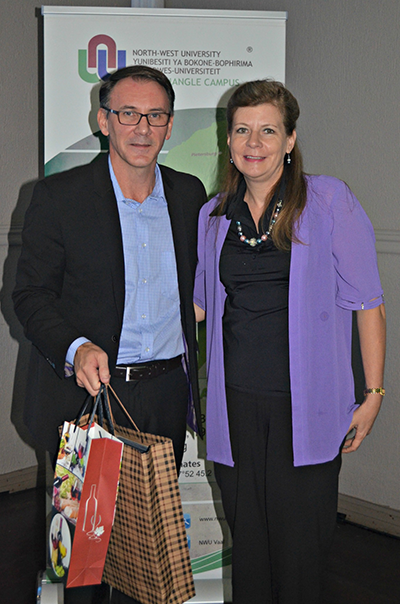Le Roux is an alumnus of the NWU Vaal and obtained his BCom, BComHons and MCom Economics degrees when the campus was still a satellite campus of the Potchefstroom University for Christian Higher Education. He obtained all his degrees with distinction. Later, he completed courses in International Trade and National Accounting at New York University.
More about the national budget
South Africa currently has a R150 billion budget deficit – this is the amount with which the government’s expenses exceed their income. Ways must thus be found to reduce this gap to prevent that South Africa’s credit rating falls even more and end in junk status.
It is a depressing thought that out of the 55 million South Africans about only 14 million are registered tax payers, and out of this only 7,4 million pays tax. The other half of the registered tax payers falls outside of the lowest tax bracket. This means that only 14% of the population, together with businesses and trusts, carries the burden of covering the government’s expenses.
In recent years South Africa’s growth rate disappointed consistently and it is unlikely that there will soon be a strong gain in economic activity. It is expected that a 2% growth rate will be the norm. With such a weak growth the government has no other choice than to increase tax rates.
Le Roux said that it is clear from minister Gordhan’s budget that he tried to follow a golden mean to find the necessary additional income without making the majority of the population, of which a big portion is poor, suffer. The result is that the new tax changes are definitely not friendly towards the wealthy. The marginal tax rate of wealthy individuals, who earns more than R1,5 million per year, has been increased from 41% to 45%. Le Roux pointed out that only an estimated 100 000 South Africans currently fall within this group.
Although VAT of 14% are left unchanged for this year, minister Gordhan clearly started to pave the way for a rate increase in the coming years, says Le Roux. This comes despite the fact that such a decision will in all likelihood provoke political resistance.
“South Africa is reaching the end of its fiscal flexibility. There is not a lot of room for movement left. The burden on personal income tax is already enormous. South Africa’s credibility is already in a critical state. Our economy is on a fine line and if we cross this line we will be downgraded even further. There is absolutely no room for mistakes. If our economy does not show any defined growth in the coming years, there will be big trouble,” Le Roux warned.
Ettienne le Roux – an alumnus of top format
Le Roux followed a career as an economist at the National Treasury after starting out as a lecturer in economics at the NWU Vaal. While employed at the Treasury, he also had the opportunity to further his studies in the United States of America. Mr Le Roux later moved into the banking environment and is now chief economist for Rand Merchant Bank (RMB).
His knowledge of the economy is sought after. In July 2013, Mr Trevor Manuel, then Minister in the Presidency: National Planning Commission, appointed him to the South African Statistics Council.
His career in banking started at First National Bank where he was an economist. Mr le Roux then joined RMB and went on to become their chief economist. An expert in currency and balance of payments, his main task as chief economist is to monitor the macro-economic environment for new trends in economic variables and policy.
He has received various performance awards, including Best Analyst of the Year, during his time at RMB. He also served for a two-year period on the Junior Management Board. Prior to being appointed chief economist, he was co-head of RMB’s fixed income, commodity and currency research team. He is also a regular face in the media and has published various opinion pieces and research articles in national newspapers such as Business Day and Financial Mail.
His ties with the NWU remain strong. On occasion, Mr Le Roux gives guest lectures in Economics at the NWU’s Vanderbijlpark Campus. From time to time he addresses Alumni on issues of global economic markets and the financial outlook of the South African economy.
In 2014 he was honoured by the NWU with an Alumnus of the Year Award.

Mr Ettienne le Roux, chief economist of Rand Merchant Bank and alumnus of the North-West University’s Vanderbijlpark Campus (NWU Vaal), with Prof Linda du Plessis, acting rector.
